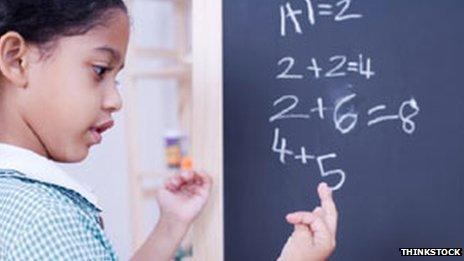Mother's thyroid level 'may predict child's poor maths'
- Published

Children born to mothers who have low levels of thyroid hormones during pregnancy tend to do worse in maths in early primary school, a study says.
Dutch researchers tracked 1,196 healthy children from birth to age five, having recorded their mothers' thyroxine levels at 12 weeks of pregnancy.
They then looked at the children's test scores for language and arithmetic.
Those born to mothers with low levels of thyroxine were twice as likely to have below average arithmetic scores.
However, the scientists - led by Dr Martijn Finken at the VU University Medical Centre in Amsterdam - said the five-year-olds' language results were no different.
The maths results were the same even after taking into consideration the child's family background.
'Next big question'
Low levels of thyroxine in pregnant women are already linked to poor mental development in infancy, possibly leading to learning difficulties and reduced physical growth.
Dr Finken said: "Whether these problems persist into adulthood remains to be seen. We will continue to follow these children to answer this next big question."
He suggested that in the future, hormone tests could be used to identify children who would need extra help in mathematics at school.
"It is possible that these children could benefit from hormonal supplements to boost their brain development in the womb," he said.
"Such treatment has been tried in the past but as yet has failed to improve cognitive ability, although timing of the treatment could influence its success."
The findings are being presented at the European Society for Paediatric Endocrinology annual meeting in Dublin, Ireland.